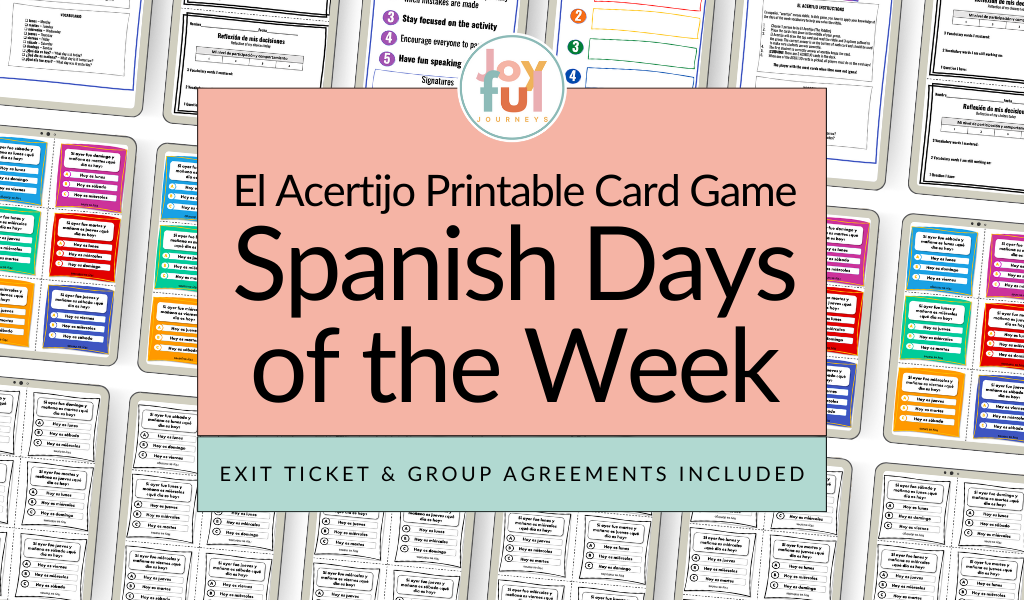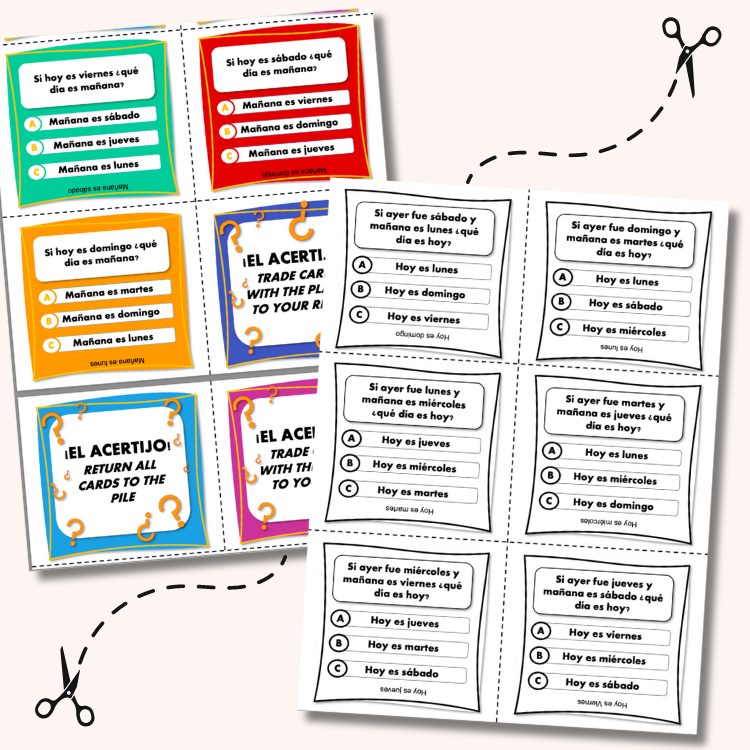Hey there, Joyful Journey Makers! Let’s talk about a super fun and effective way to get your students both thinking and speaking—riddles and card games! When you incorporate riddles into your Spanish classroom, you’re not just adding a fun activity; you’re engaging students’ brains in problem-solving, critical thinking, and communication. Plus, riddles tap into the benefits of game-based learning, which we know enhances language acquisition in meaningful ways. Let’s explore how riddles work to improve language skills, some science-backed reasons behind why game-based learning works, and how you can easily bring this to life in your classroom with my Spanish Days of the Week Riddler Card Game.
Why Riddles Are Effective for Language Learning Sparks Curiosity
The Science Behind Game-Based Learning and Language Acquisition
Game-based learning, especially with activities like riddles, taps into several key areas that enhance language learning:
- Active Learning: When students participate in games, they’re actively engaging with the material. This is much more effective than passive learning, where students simply listen or read. In fact, research shows that active learning leads to better comprehension and retention of new vocabulary.
- Emotional Connection: Games like riddles also generate excitement, laughter, and enjoyment, creating an emotional connection to the material. When students associate positive emotions with learning, they’re more likely to retain the information long-term.
- Social Learning: Games promote social interaction, which is critical for language acquisition. Through conversations with peers, students practice speaking and listening in real-time, building their fluency naturally.
In their article, McCaughey and Rosenberg highlight how board games are not just fun—they’re powerful tools for language learning. By creating a student-centered environment that promotes active engagement, turn-taking, and social interaction, board games give students a chance to express their thoughts and opinions naturally. The best part? Students practice language skills without feeling the pressure of formal instruction. It’s a low-stress, high-engagement way to build confidence, boost retention, and encourage participation. As students play, they practice real-world language use in a fun, relaxed setting, reinforcing their skills while building connections.
3 Easy Ways to Use Riddles in Your Spanish Classroom
Now that we know why riddles are effective, here are three easy ways to use them to practice Spanish vocabulary in your classroom:
- Warm-Up Riddles: Start your class with a daily or weekly riddle in Spanish. This sets a fun, lighthearted tone for the lesson and encourages students to think critically from the start. You can tie the riddles into whatever vocabulary or grammar you’re working on that week.
- Riddle Stations: Set up riddle stations around the classroom, with each station focusing on a different concept (such as days of the week, numbers, or colors). Students rotate through the stations, solving riddles as they go. This keeps the energy high and ensures that all students are actively engaged in the learning process.
- Riddle Relay Race: Divide the class into teams and have a riddle relay race! One team member must solve a riddle and say the answer out loud before tagging the next teammate to solve the next riddle. This adds an element of friendly competition and motivates students to practice their speaking skills.
Get Your FREE Resource: Spanish Days of the Week Riddler Card Game (El Acertijo)
Looking for a fun, ready-to-go resource that gets your students talking and thinking? My Spanish Days of the Week Riddler Card Game (El Acertijo) is perfect for helping students practice days of the week vocabulary in a way that’s interactive, engaging, and educational!
What’s Included:
- Riddle Cards: Students solve riddles based on the days of the week. Each card asks a question like, “Si ayer fue sábado y mañana es lunes, ¿qué día es hoy?” (If yesterday was Saturday and tomorrow is Monday, what day is today?). Students must use their knowledge of days of the week to find the correct answer.
- Game Instructions: The game is easy to set up! One student is chosen as “El Acertijo” (The Riddler), and they read riddles aloud to the group. The first student to correctly answer wins the card. Be careful, though—there are special Acertijo cards in the deck that add twists and turns to the game!
- Interactive Gameplay: This activity is perfect for small groups, whole-class participation, or even independent practice. Students will love the challenge of figuring out the riddles while reinforcing their Spanish vocabulary.
How to Use El Acertijo in Your Classroom
- Small Group Fun: Divide students into small groups and let them take turns being “El Acertijo.” As they read the riddles aloud, they practice their speaking and listening skills. The competitive nature of the game keeps everyone on their toes!
- Whole-Class Challenge: Turn it into a whole-class activity by having one student be “El Acertijo” and ask the riddles to the entire class. The first student to answer correctly wins the card. It’s a fun way to practice days of the week vocabulary as a group!
- Review or Warm-Up: Use this game as a review activity or a warm-up at the beginning of the week. It’s a great way to reinforce vocabulary in a low-pressure, enjoyable environment that still promotes critical thinking.
The Gist of it All
Riddles are a powerful tool for language learning because they combine critical thinking, problem-solving, and communication—all while making the classroom fun and engaging. My Spanish Days of the Week Riddler Card Game (El Acertijo) is the perfect way to incorporate riddles into your lessons and give students a memorable way to practice vocabulary.

Resources
Busciglio, D. (2023, July 14). Why real conversation is key to language learning. Why Real Conversation Is Key to Language Learning. https://www.lessonface.com/content/why-real-conversation-key-language-learning
McCAUGHEY, K., & ROSENBERG, R. (2024). Let Them Play: Board Games for Language Practice. U.S. Department of State. https://americanenglish.state.gov/forum




